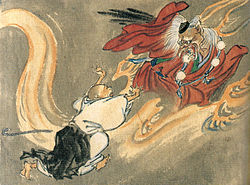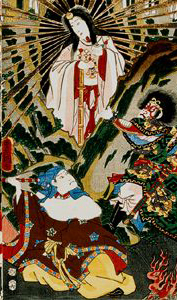Tengu (“heavenly dog”) are a type of legendary creature found in Japanese folk religion and are also considered a type of Shinto god (kami) or yōkai (supernatural beings). Although they take their name from a dog-like Chinese demon (Tiangou), the tengu were originally thought to take the forms of birds of prey, and they are traditionally depicted with both human and avian characteristics. The earliest tengu were pictured with beaks, but this feature has often been humanized as an unnaturally long nose, which today is widely considered the tengu’s defining characteristic in the popular imagination.
Tag: Kami
What is a Kami?
Kami are the spirits or phenomena that are worshipped in the religion of Shinto. They are elements in nature, animals, creationary forces in the universe, as well as spirits of the revered deceased. Many Kami are considered the ancient ancestors of entire clans, and some ancestors became Kami upon their death if they were able to embody the values and virtues of Kami in life. Traditionally, great or charismatic leaders like the Emperor could be kami.
In Shinto, Kami are not separate from nature, but are of nature, possessing positive and negative, good and evil characteristics. They are manifestations of musubi , the interconnecting energy of the universe, and are considered exemplary of what humanity should strive towards. Kami are believed to be “hidden” from this world, and inhabit a complementary existence that mirrors our own, shinkai [the world of the Kami]. To be in harmony with the awe inspiring aspects of nature is to be conscious of kannagara no michi [the way of the Kami].
Though the word Kami is translated in multiple ways into English, no one English word expresses its full meaning. In this way, the ambiguity of the meaning of Kami is necessary, as it conveys the ambiguous nature of Kami themselves.

